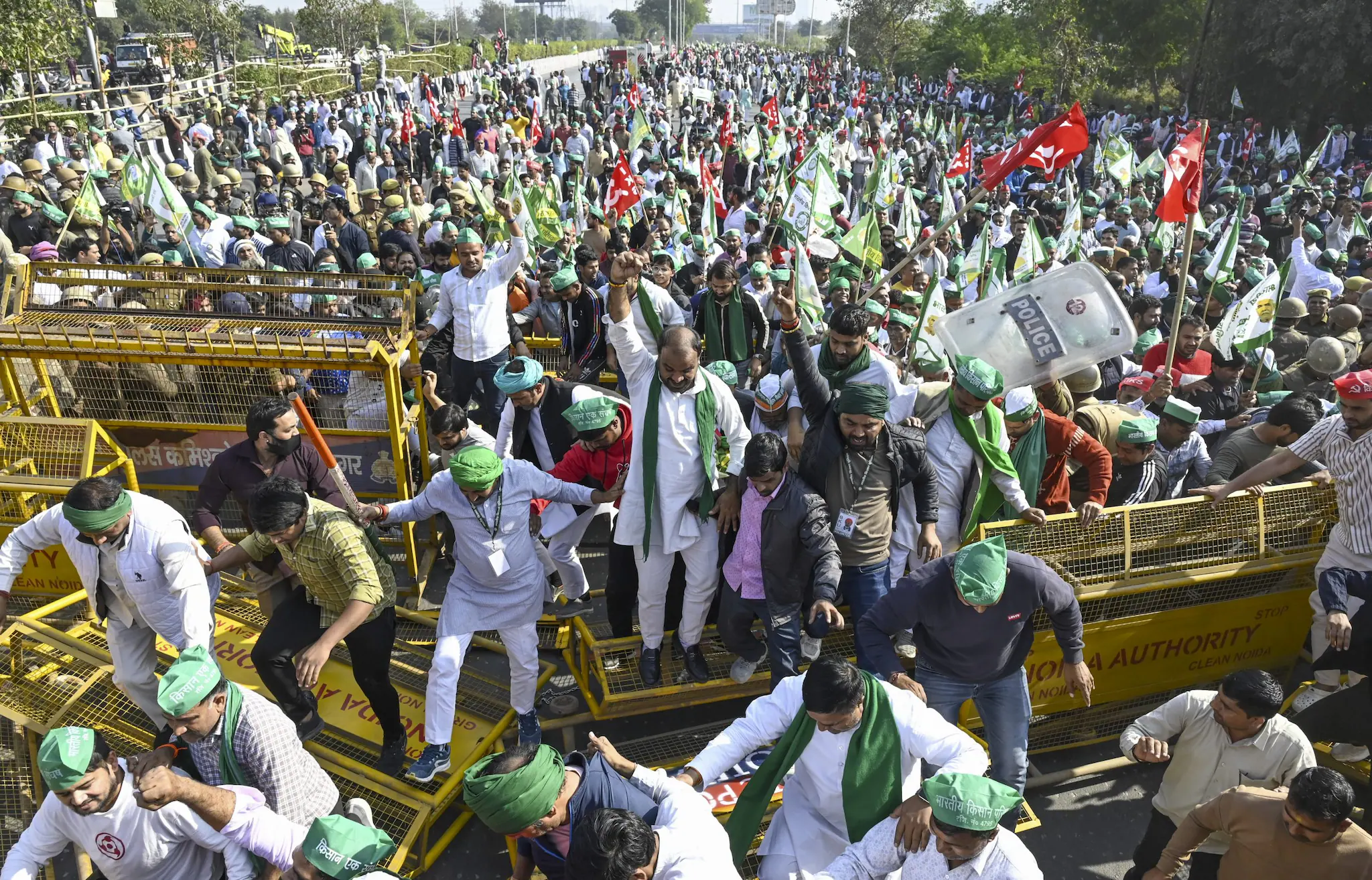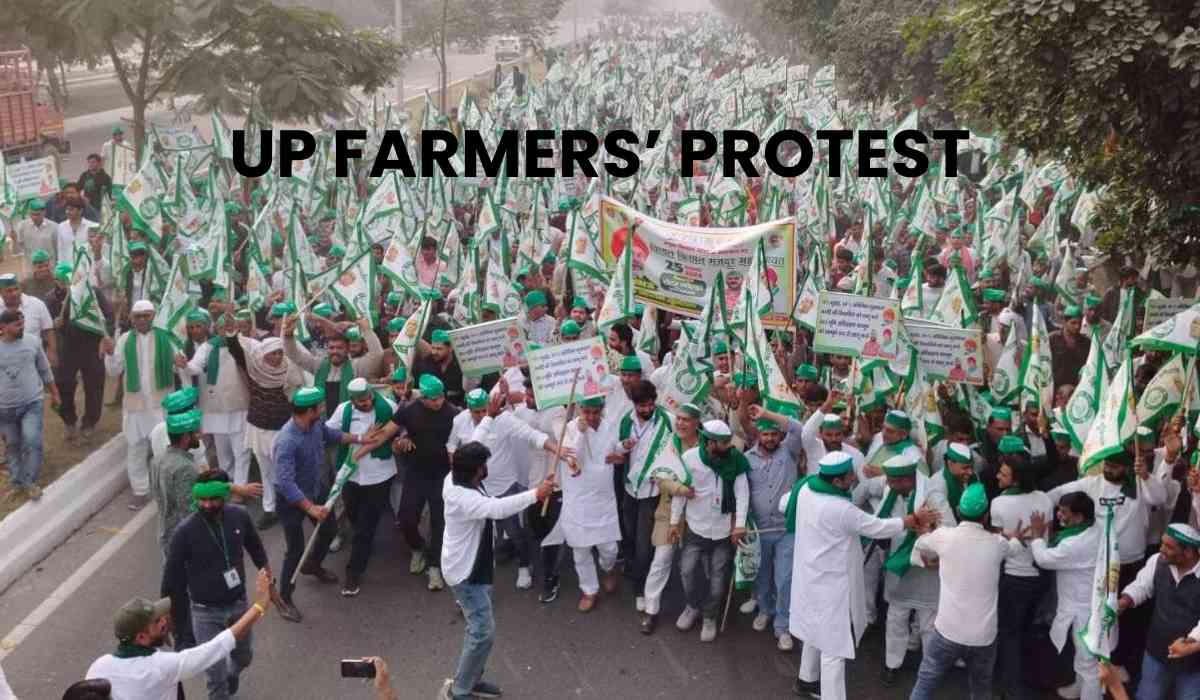The ongoing farmers' protests in Uttar Pradesh, particularly in Noida and Greater Noida, have intensified as farmers demand fair compensation for their acquired land and better benefits from the state government. These protests, led by several prominent farmer organizations, have garnered significant attention, drawing thousands of farmers from various districts in the state.
-1733279724968_1733316609.webp)
Key Issues Behind the Protest
Farmers are protesting primarily due to concerns over land acquisitions that occurred between 1997 and 2008. The main issues include:
-
Inadequate Compensation:
-
Farmers claim compensation was given at outdated rates, significantly lower than the current market prices.
-
They are demanding a 64.7% increase in compensation, which reflects inflation and updated land market values.
-
-
Land Allocation for Farmers:
-
A key demand is the allocation of 10% of acquired land for residential and commercial purposes to the original landowners.
-
-
Legal and Social Benefits:
-
Farmers are seeking legal guarantees, including reservations in schools, free electricity, water, and other welfare benefits for displaced families.
-
-
Land Acquired After 2014:
-
Farmers whose land was acquired after January 2014 are demanding a 20% share of the acquired land.
-

Farmer Organizations Leading the Protest
Several influential farmer organizations are spearheading the protest, including:
-
Bhartiya Kisan Union (BKU): Led by Rakesh Tikait, this union has been vocal in its demands for compensation and other benefits.
-
Sanyukt Kisan Morcha (SKU): Known for leading the 2020 protests against farm laws, the SKU has continued to fight for farmers’ rights.
-
Bhartiya Kisan Parishad (BKP): A key player in mobilizing farmers for the protest.
-
Kisan Mazdoor Morcha (KMM): Another significant organization pushing for farmers' issues.
Recent Developments and Escalation of the Protest
The protest has seen escalating tensions, with notable events such as:
-
Early Stages of the Protest (November 2024):
-
Farmers began protesting in Noida on November 25, 2024, and later marched toward Delhi to draw attention to their demands.
-
-
Police Detention and Protest Stoppage:
-
Farmers were stopped at the UP-Delhi border and over a hundred were detained by the police.
-
-
Protests in Greater Noida:
-
On December 2, 2024, farmers gathered at Dalit Prerna Sthal in Greater Noida, leading to further detentions, especially of women and the elderly, who were later released.
-
Vice-President Dhankhar's Criticism of the Government
-
Call for Immediate Dialogue:
-
Vice President Jagdeep Dhankhar urged the central government to initiate direct discussions with farmers.
-
He criticized the government's inaction, stating that failing to engage in talks would be an impractical approach to policymaking.
-
-
Disconnect Between Government and Farmers:
-
Dhankhar expressed concern over the growing disconnect between farmers and the government, despite India’s growing global stature.
-
-
Warning of Consequences:
-
Dhankhar emphasized that ignoring farmers’ concerns could have severe consequences, warning that no force could suppress the farmer's voice.
-
Police Detentions and Rising Tensions
-
Detention of Rakesh Tikait:
-
Rakesh Tikait, the influential spokesperson of the BKU, was detained by the Aligarh police while en route to Greater Noida to join the protest. He was later released but warned of intensifying protests if the situation did not improve.
-
-
Escalating Protests:
-
Despite these arrests, protests continued, with hundreds of farmers gathering at Zero Point in Greater Noida, demanding compensation and the implementation of fair policies.
-
-
Protests in Western UP:
-
The BKU mobilized its supporters from various districts in western Uttar Pradesh to join the protest, particularly focusing on land compensation and agricultural reforms.
-
Government's Response
-
Formation of a 5-Member Committee:
-
The Uttar Pradesh government has formed a 5-member committee under the leadership of IAS officer Anil Kumar Sagar to address the farmers' concerns.
-
The committee is expected to submit a report within a month, although there is skepticism among farmers about the government's commitment to resolving the issue.
-
-
Previous Committees and Unfulfilled Promises:
-
Earlier, a committee chaired by the Revenue Board Chairman was also formed to review farmers' demands, but its recommendations have not yet been implemented.
-
The ongoing protests underline the stark divide between the agricultural community and the government. Farmers are demanding fair treatment for their lands and livelihoods, with mounting frustrations over the lack of substantial action from the authorities.
-
Key Factors for Resolution:
-
A genuine, productive dialogue between the government and farmers is essential to prevent the situation from worsening.
-
Farmers need fair compensation, land allocation, and legal guarantees to ensure their welfare.
-
If these issues remain unaddressed, the protests are likely to continue, and the political landscape in Uttar Pradesh may face significant consequences. The central government, as well as state authorities, must take prompt action to resolve the situation, or risk further unrest among the agricultural community.
With inputs from agencies
Image Source: Multiple agencies
© Copyright 2024. All Rights Reserved Powered by Vygr Media.





















